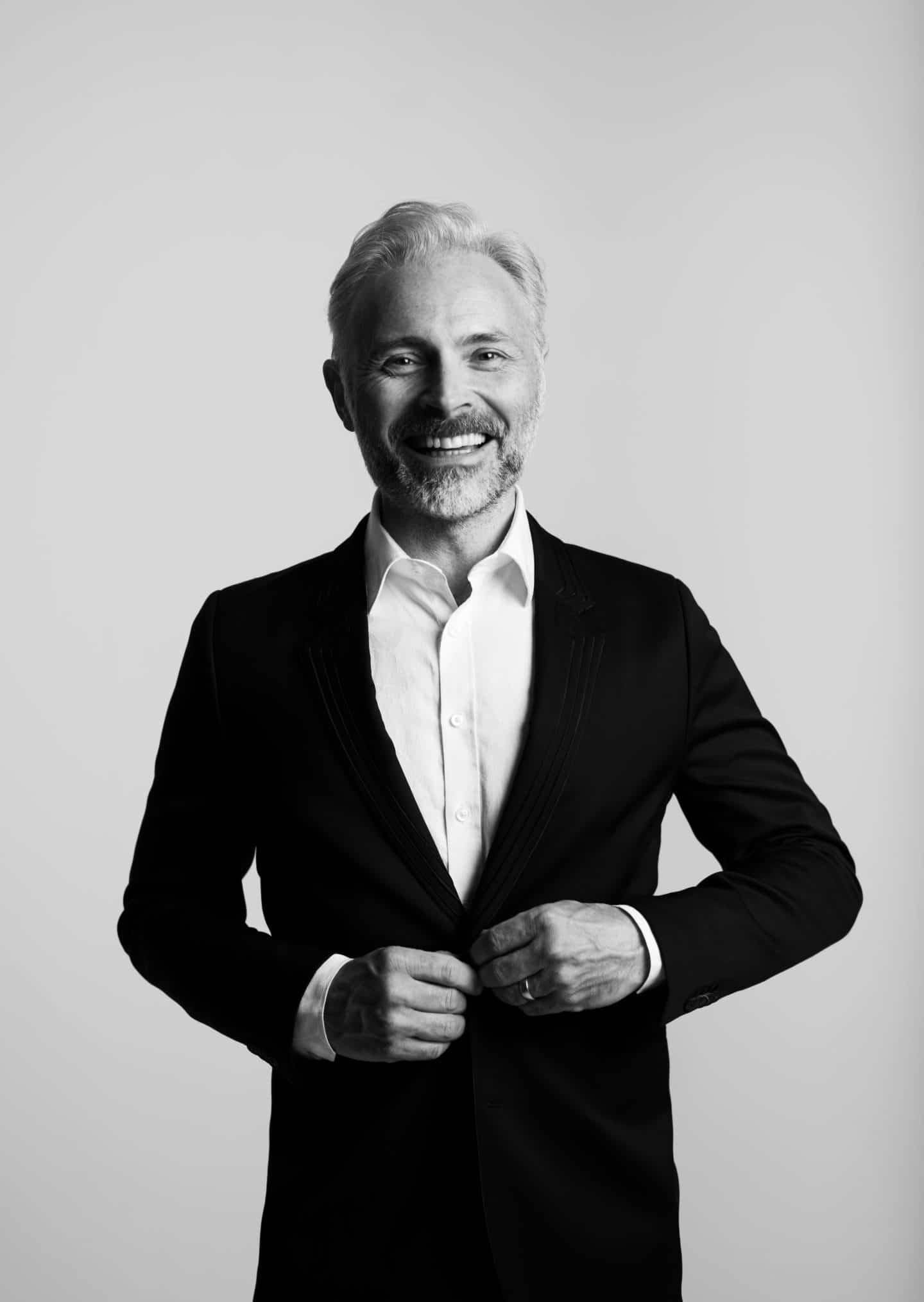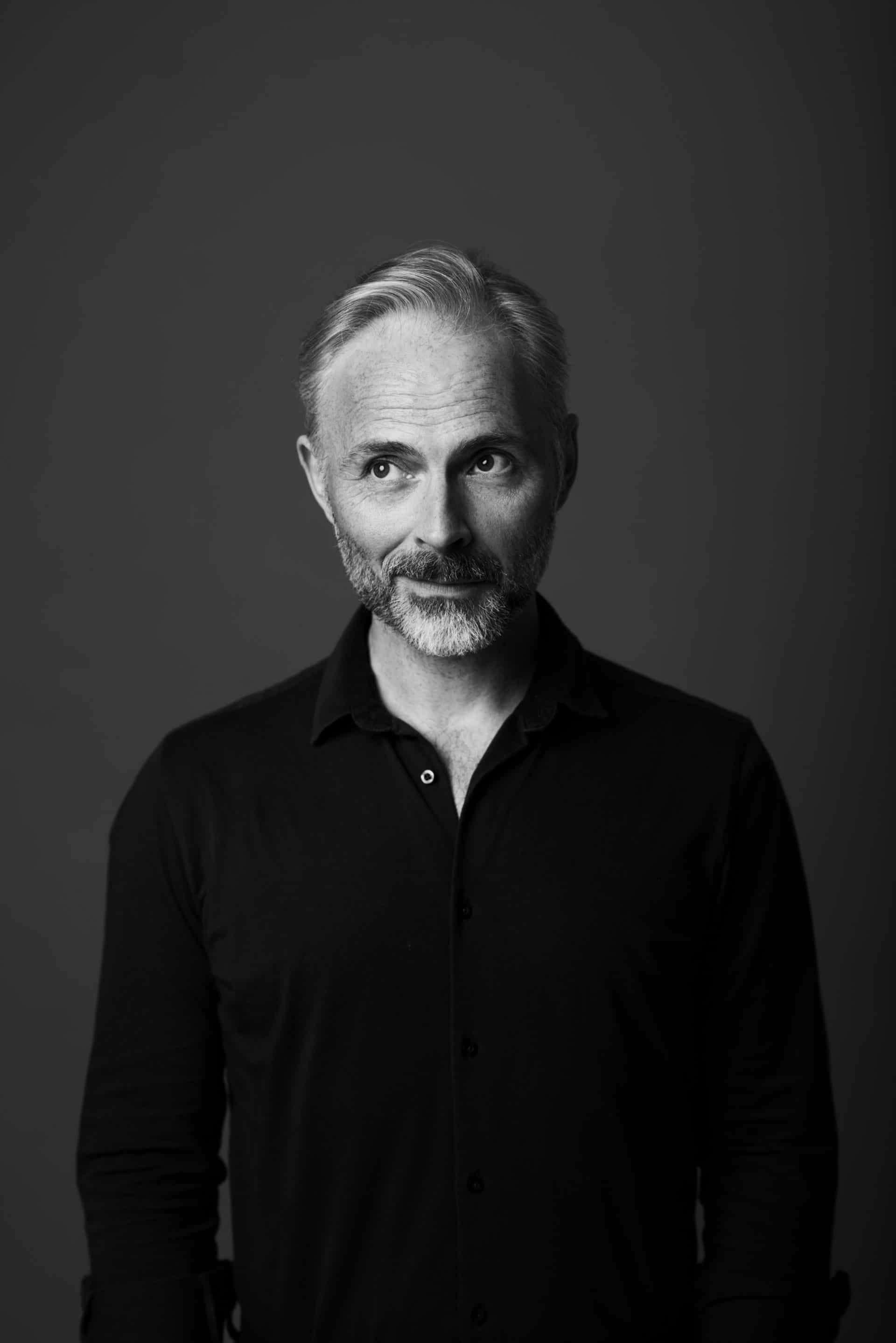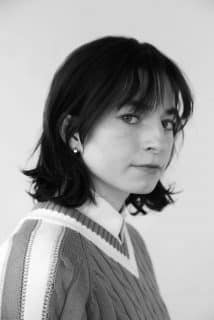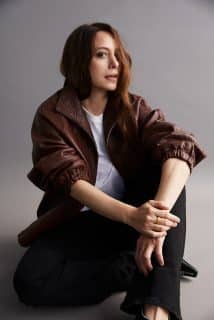Mark Bonnar on Guilt season 2 and fashion faux pas
Culture
Mark Bonnar speaks to us about the new series of the excellent 'Guilt' as well as turning up to school in Leith in history's worst outfit.
Mark Bonnar is a total hero and that’s that. ‘Catastrophe’, ‘Eric, Ernie and Me’, ‘Shetland’, we all know him as a serious talent, and we all know that white quiff and that wry, dark wit – if you’re all present and correct as a human, you will also know him indelibly now as Max in ‘Guilt’, in which he reaches new levels of quiffdom and wry, dark wit in Neil Forsyth’s unbelievably good blacker then black comedy of manslaughtery errors. After the success of the first series – which came out on BBC Scotland first then quickly gathered momentum on BBC Two and the iPlayer as its formula of pulpy twists, killer one-liners and brilliantly untrustworthy characters created a genuine word-of-mouth sensation – season two has just landed and well, is more sheer joy. No spoilers here. Instead, we have a chat with Mark Bonnar himself, who is every bit as fun as you’d imagine – though without the aforementioned quiff (shaved off, for a role) – and someone for whom success is taken with a pinch of Leithian salt…
Did the response to the first series of Guilt surprise you?
Yeah. It surprised us all. I think we knew we had something special because Neil’s scripts were fantastic. We knew it was a great cast and it felt good when we were doing it. But I think the response was kind of beyond our wildest dreams. The word of mouth thing really surprised us. The fact that it was drip-fed to people, so it was on BBC Scotland first and then six days later it was shown down here, I think it really helped with the suspense and the story. It was that good old fashioned: ‘tune in next week to see what happened.’ It really captured people’s imaginations. I love it, and it was incredibly gratifying to see that other people do too, you know.
In terms of putting together Max as a character, was it something that was all on the page or was it something that you developed with Neil as it went along?
Ah it was all on the page. Neil is a master at that kind of character driven thing. Often when somebody says character driven, you think ‘oh is the story is going to be a bit shit then’, but Neil is the master of providing incredibly well worked out characters with real motivations who act in sometimes ridiculous ways – but we all do, and that’s the whole point. Although Max is a condensed version of many of our most extreme behaviours, it’s still believable for that reason.
So everything that you saw was certainly Neil’s, though obviously I brought me to it because I can’t help but bring me to it. I think it’s a combination of those two things, wonderful writing, and somebody who’s not a million miles away from the character! Well, OK I am a million miles away from him, I’m just, you know, somebody who’s not going to fuck it up, hopefully.
How is it working with the cast? They’re all playing very distinctive characters, but what was it like on set?
Oh, it was wonderful. I mean, it wasn’t just me that believed in what we were doing. Everybody was completely invested, and loved the script and wanted to do the best possible job. It’s one of those jobs where you have a really good story to tell, and are excited about sharing it so the fun springs from that excitement.
It doesn’t matter in a sense whether it’s a deeply dark story about mass murder or something light and fluffy, if it’s a good thing that you’re doing, and you know that it’s good and you have that sense of excitement of sharing it, then it will be fun, no matter what the story is.
Did you do much research? Is that the way you work on such a character?
No, it’s all in the script. You find out why Max partly is the way he is, what happened when they were growing up. Any blanks I could fill in with Robbie McKillop, the director, we’d both have a chat if there was anything lacking or that I needed to be mindful of.
Research. I mean, it’s all dependent on the job, you know? The job I’m doing just now has required a lot of research, but only because it’s a true story – you want to delve in as much as you possibly can and not get anything wrong. But with something like ‘Guilt’, it’s entirely fictional, obviously, and it was delivered on a plate so wonderfully – if the characters are that well drawn and the story is that good and motivations are that apparent, then there’s no need for research.
Can you tell us about your acting and how you kind of get into character? Are you the type of person who’s always in character, or is it something that you can switch on?
Again, it’s solely dependent on the job. With ‘Guilt’, I’d spend a little time before camera rolls, just making sure your head in the right place for what’s coming up. But you’re essentially playing – to discover things at any point creatively, you have to keep open and alive to your sense of play and be listening and be aware. So having fun on set – obviously dependent and with reverence to what you’re doing – is an important part of discovering and play and openness.
The show I’m doing just now, I’m doing a Hertfordshire accent, so I’ll get in the car in the morning, whatever time I’m picked up and I’ll speak in that accent from being picked up to wrap because it gives me one less thing to worry about. I’m not necessarily in character, I’m just in the accent. I’ve never, ever, ever stayed in character for a whole day. I think that’s tiresome for everybody around you and for you. I know some actors get amazing results doing it, of course, but I think that it’s very tricky, you know, because you have a whole lot of things to negotiate on a daily basis, so I think unless everybody is buying into that and knows that you’re in character…you speak to all kinds of people all day on a film set so unless you’re going to withdraw from all that, it seems like an awful big ask to me.
You’ve always got a sense, because you’ve done the work, whatever that work entails, you always get a sense of the character so you can turn it on. That’s a knack in itself. But no, it sounds like an awful trudge to just stay in character all day. Who does that? Daniel Day Lewis can afford to do it. But I’d be interested to speak to Daniel and go, ‘Listen, just once, try not doing it. See what happens. It might be amazing!’
Some people believe that’s the ultimate to be staying character all day, but, is it necessary? I understand where it’s coming from because I do the job, obviously, but I’ve done the job without ever doing it. I didn’t do the accent all day for Eric Morecombe, instead there was a sense of fun again.

It brings up the question of whether elements of the character bleed into your real life. Do you ever find that?
I think when you’re doing theatre, there’s more of that because it’s with you. You have four weeks or more of rehearsal, you’re in every day, you’re thinking about it, you’re kind of inhabiting it more. It’s a different kind of beast. So yes, I find that a character when I’m doing a play will be around me. It’s hard to talk about things without sounding like a complete tosser! Anyway, it kind of inhabits you more when you’re doing a play, but when you’re on telly, because of the nature of it, you’ll be doing six certain pages a day or something and you let it go. You think about the scene that you’re doing, you do it maybe six times on the day, and then you never do it again. You don’t have to have the whole story in your head for three months.
For season two of ‘Guilt’, what can you tell us? We last saw Max in a police car but giving a little smile…
He had that smile wiped office face by being inside for the period between the end of series one and the beginning series of two – he’s done time for manslaughter. So, yes, he’s out at the beginning, but he’s not entirely left it behind. He’s changed, I would say, probably because you can’t be inside for a couple of years and come out thinking you’re cock of the walk anymore. He’s trying to find his feet again. But there’s all kinds of other things going on which aren’t apparent or become apparent as time moves forward.
What was it like filming it, was it different this time around?
Well, with COVID it was pretty much everybody’s first job back for cast and crew after being in lockdown for eight months or whatever it was at the time. It was weird being virtually a hermit and then suddenly being in a room with 30 people. It was odd, but it was a learning process, and it has been since then for every job that I’ve done, getting used to the new way of working.
In a way it kind of suited the feel of the series, too, you know, that slight paranoia that drives a lot of things that happen. I don’t think it was necessarily a bad thing that sort of unsure footedness.
Do you get recognised in the street a lot?
I’m in disguise just now [points to shaved head]. I do get recognised but I’m not recognisable for one character in particular. I don’t think. People might be big ‘Catastrophe’ fans or ‘Shetland’ fans. I think people usually think I’m somebody they know. So they may look confused, and then by the time I walk past them, they might realise and go, ‘oh, I loved you in, oh, what was that a thing with… what were you in?’
What are your annoying habits, what drives people mad on set?
Probably singing.
What kind of thing?
Nonsensical things. So for some reason that Reef song is in my head at the moment, ‘Place your hands’, and if somebody says, ‘Can you get some coffee?’ I’ll go [to the Reef tune] ‘get some coffee, get some coffee!’ It’s that kind of stupidity. I’ll take something somebody said and put it to music. The theme tune from Mr. and Mrs comes into my head quite a lot. If somebody says something and it reminds me of the rhythm of a song I’ll sing it straight away out loud. When someone cottons onto that, it must be really annoying.
What your go-to bit of trash TV or film?
I watch boxing. I love boxing. If I’ve got five minutes and YouTube, then I’ll go and watch the first Castillo/Corrales fight again for the umpteenth, time because it’s one of the best fights ever. And I have to do it online because nobody else in the house like boxing. That’s my guilty pleasure
Have you had any fashion faux pas in the past?
Yeah, haven’t we all. Back in the 80s my mom gave me money for school clothes. I went up to Cockburn Street in Edinburgh, and I bought a black string vest, and green trousers with a yellow kind of waist bit. Olive green and mustard yellow. And I wore all that to school. My mum made me wear it to school, and I wore it with black Oxfords and cream leg warmers. Boom, there you go. I was brave even back then.
The thing was I was in the 3rd year, I was at senior school. Junior school was besides Eastern Road. So first and second year you went to school there, then third year you moved up to a big school and it was everybody. I think I only did it for one day, though and then that was enough because everybody just went [pulls face]. I’m surprised I survived.
So people were too shocked to hit you?
Well, that day. Other days I got hit It was Leith-y, It was back in the Irvine Welsh days when Leith was the heroin capital of Europe. It was rough as a badgers arse
Guilt returns on BBC Scotland and iPlayer on 12 October, and BBC Two on 14 October.
Photos by Pip.
Trending

Join The Book of Man
Sign up to our daily newsletters to join the frontline of the revolution in masculinity.

















